Growing up on the Navajo Nation, it’s common to know someone without access to electricity. For me, this includes my great-grandmother, who lives in Black Mesa, Arizona. I grew up in Window Rock, the capital of the Navajo Nation. So as a child, I would often wonder why we had electricity and she didn’t. These types of questions led me to experiment with small circuits and electronics. From then on, I’ve had an interest in electronics and learning how things work — and finding their application to real-world problems.
My dad went to school for electrical engineering and works for the utility company on the Navajo Nation: NTUA (Navajo Tribal Utility Authority). As I was growing up, I knew I had an interest in electronics before I realized my dad had gone down the same path. So, interestingly, I am following in his footsteps.
Being homeschooled, I learned the most from my mom. My sister and I would say we had no break from school, because we learned at home. My mom would encourage us to think about what we would like to do after high school. I knew I wanted to get a degree in electrical engineering and take what I learned back to the Navajo Nation. AISES has been very helpful in my education. It was a combination of networking at AISES as well as college tours that helped me choose the University of Denver. And it was through AISES that I met my academic advisor there. It was also AISES that opened opportunities for summer internships — I have had various internships that I’ve learned a lot from.
After my second year in college, I had an internship at NTUA. Although I had some tough engineering classes, going back to the Navajo Nation and working at the utility helped me remember what I was working toward.
The following year, I had an internship at Tséhootsooí Medical Center in Health Promotion and Disease Prevention. Although this was outside my major, the internship involved engaging with and caring about the health of the community. Through face-to-face interactions from this internship, I learned that my efforts contributed to the overall health of my community.
The summer after I received my bachelor’s degree, I worked at Sandia National Laboratories in the Indian Energy Program. The internship involved visiting various reservations to see renewable energy projects. I also had a research project that was focused on analyzing the operation of refrigerators in off-grid solar/wind systems on the Navajo Nation. I enjoyed this research as it could greatly help those who need refrigeration but do not have the option of connecting to the electrical grid.
Each reservation has problems that are unique. But regardless of the status or condition of the reservation, it’s the people who take action who make a difference in their community. So I think that Native people in a position to go to college and get an education, and who are able to go back to the reservation, should do that. That is how we can make positive change in our communities.
Throughout these internships, the fact that I wanted to do work that creates positive change on the Navajo Nation was constantly reinforced. This led me to pursue my master’s degree at the University of Arizona in the Indige-FEWSS Program, which focuses on food, energy, and water problems on the Navajo Nation. Through that program I have had the opportunity to do research I enjoy and work that is applicable to problems on the reservation. I have also been able to work with college students on the reservation.
One of the most challenging things about college was being far from home in an unfamiliar environment. I went from growing up on the reservation where nearly everyone is Native to a college where I can count the number of Natives on campus with my fingers. I would say it was a bit of a shock at first, and it took me a while to get adjusted. But what helped me through it was surrounding myself with those who have a similar background. That included our weekly Native student alliance meetings. The fact that I was so far away from home reminded me why I should keep going.
For those who hope to go to college, I would say to go out and look for opportunities. It may seem impossible, but there are opportunities out there — you just need to find them. Develop a goal, make a plan, and take small steps that will help you get there. Don’t give up. Remember that we are rooting for you.














